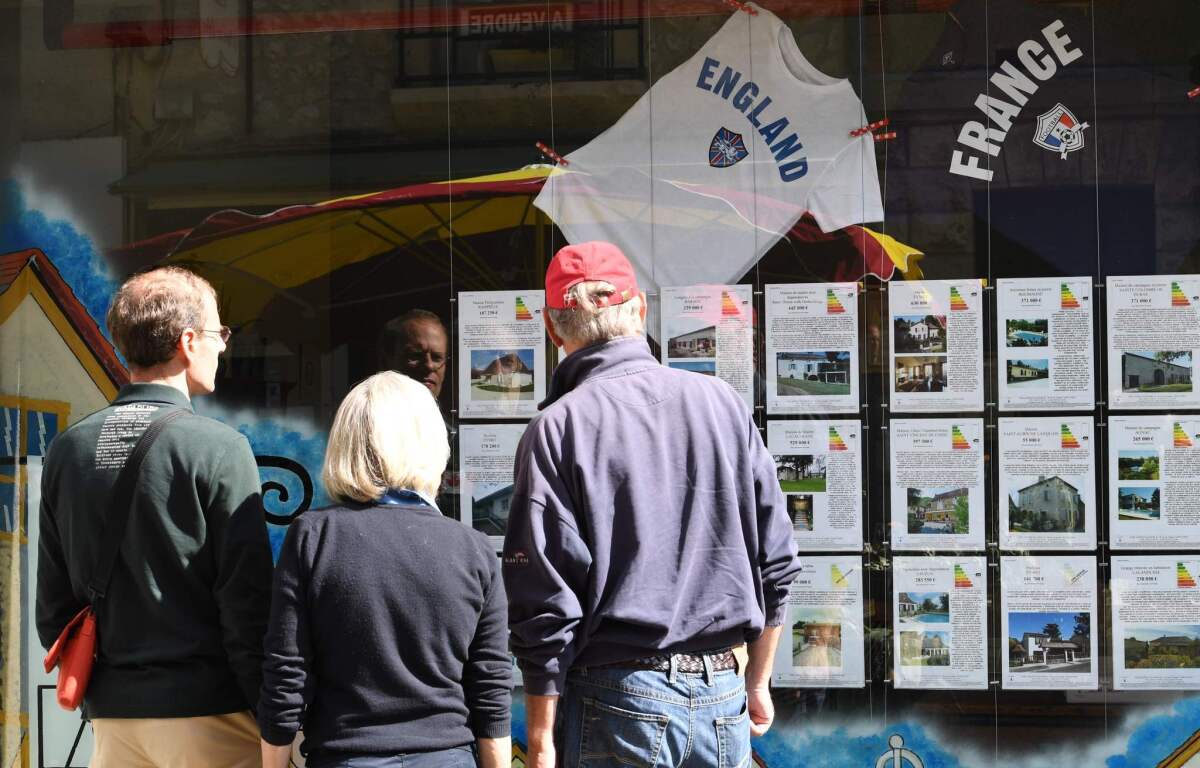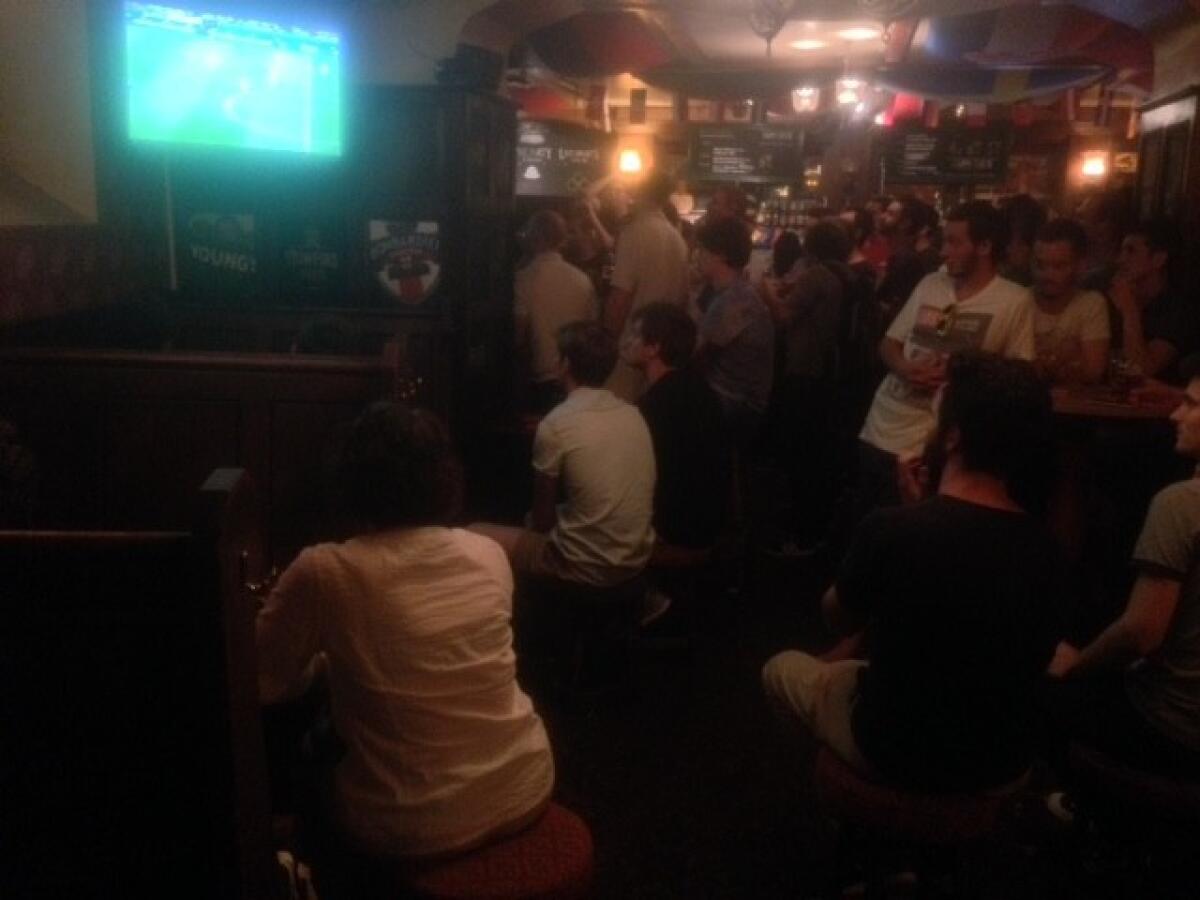For thousands of Brits, France is home. But what happens after Brexit?

- Share via
Reporting from Toulouse, France — Standing in the doorway of the London Town pub one evening this week, Sam Mason could not have looked more English or felt more European.
Wearing a white English soccer jersey, he had painted a small English flag on his forehead and was cradling a pint glass in his arm as he and close to 100 other fans cheered their team in a European Championship match. But although he was born near London, he now lives in the south of Spain and had come to a British pub in France’s fourth largest city to watch the game with his Parisian girlfriend.

Normally, nothing could tear him away from concentrating on such a critical game. Yet on this night, he was more than willing to pause and vent his fury when asked about the recent Brexit vote by his compatriots.
Though it won’t change his life immediately, he worried that the United Kingdom’s eventual exit from the European Union would eventually limit his ability to freely roam the continent where he had forged close connections that made him feel part of a bigger world.
“I am so angry,” he said, shaking. “What I’m really sad about is all the relationships that will be torn apart and lost.”
Now Mason, an English teacher in a small town near Gibraltar, unexpectedly finds himself cast adrift in a sea of uncertainty along with about 2 million British expatriates living across Europe. The United Nations calculates that there are 185,000 British nationals living in France, although some estimates are substantially higher. Many Britons who don’t live full time in France own property as rentals or vacation homes.
Unlike the people who supported the Brexit, these migrants have embraced the opportunity provided by open borders and now find themselves recalculating plans to decide how — and in some cases whether — to remain. Indeed, there are lots of questions flying around Internet forums and Facebook about such matters as what new paperwork may be required to how to obtain a French drivers license (a simple process for EU residents) and whether getting married would make it easier to remain in France.
We feel a stronger shift to France and less of a desire to go back to the U.K.
— Neil Cordwell, a British national who lives in Franceâs central Dordogne region
There also is anxiety about how the tax status of British residents will change, and what will happen to British-owned businesses. So far, there are more questions than answers.
Being in the EU means British expats in France and other European countries enjoy the same property rights as local citizens, as well as rights to work, operate businesses, have guaranteed access to a country’s health care system, and vote in local French elections.
French banks treat British residents the same as French citizens when it comes to offering mortgage rates, and there are various pension guarantees that make it easier for retirees to relocate in the EU. France also levies far higher capital gains taxes on non-EU residents.
Among those weighing their future are Neil Cordwell and Linda Lovelock, a semi-retired couple living in France’s central Dordogne region.
Cordwell had lived in France off and on since 1987. He and Lovelock eventually bought land just outside Eymet, a rural area where one-third of the residents are British. Eymet was the subject of a British TV reality show called “Little England” in 2011, and Cordwell said he liked that fact that a local village had a cricket team.
With the British pound typically much stronger than the euro, buying land in France has long been a bargain for people in the U.K. But with the pound falling to a 31-year low after the Brexit vote, Cordwell said the couple’s savings in Britain have taken a hit. He’s also heard about some British who had been in the process of buying land in the region putting their plans on hold.
Now Cordwell and Lovelock are trying to figure out how to transfer their remaining assets from the U.K. to France. And despite still having family in Britain, they are more resolved than ever to stay in France, even to the point of considering applying for citizenship.
As an immigrant himself, Cordwell is finding it hard to stomach the anti-immigration wave that seemed to drive the “Leave” campaign in Britain.
NEWSLETTER: Get the day’s top headlines from Times Editor Davan Maharaj >>
“We feel a stronger shift to France and less of a desire to go back to the U.K.” he said. “Personally, I’ve seen some racist and xenophobic comments being made in Britain and it’s not something we feel drawn to. It makes me feel quite sad to hold a British passport when I see that kind of reaction.”
Back in Toulouse, James Tyrrell had already begun preparations in case the U.K. voted for Brexit.
Tyrrell, 36, who grew up in North Devon, arrived in Toulouse in 2009 almost by chance after a European biking tour. He still fondly remembers how easy it was to roam across borders and explore different cultures before pausing for the winter in Toulouse.
To his surprise, he never left. Instead, like thousands of other British residents, he found himself putting roots down in this southwestern city. Many were drawn by the region’s largest employer, Airbus, which is partially owned by several European governments.
Several surrounding small towns have been transformed into English-speaking colonies. And in Toulouse, anyone longing for a taste of home can always visit the George and Dragon Pub or the So British tearoom.
Tyrrell received a certificate to teach English, and later opened his own language school, Jardin Culturel. Though his own French-speaking skills are solid, he’s laid out an eight-month intensive program for himself to prepare to take a language test required to apply for citizenship. The U.K. allows residents to hold dual citizenship, so expats like Tyrrell don’t have to give up their British passports if they also become French citizens.
Still, it’s a daunting process, and the French bureaucracy can make it particularly complex. But he’s determined to amass the mountain of paperwork he needs to formally apply to make sure that any children he has will enjoy the benefits of being part of the EU.
“This way they will still have a foothold in Europe,” he said.
Beyond anxiety over practical and legal matters, however, British residents in France are mainly trying to find time to cope with an overwhelming feeling of sadness.
Joanna Kirk lives in Paris, where she runs public relations for a start-up accelerator called NUMA. Kirk has a British father and Austrian mother, but was raised mostly in France and travels frequently to London for business.
She’s been stunned by the vote, as well as the anti-European sentiment in Britain, which has left her with a sense of betrayal. For now, she’s taking solace in the kind words of support from French friends.
“The first reaction among my British friends here was very emotional,” she said. “We feel very deeply European. It feels like not understanding what’s going on in our own country. None of us could believe this was happening. My French friends have been coming up to me and hugging me and saying, ‘We still love you guys.’”
O’Brien is a special correspondent
ALSO
European Union leaders pledge success as a 27-nation bloc, leave Britain’s seat empty
Britain voted to leave Europe, but how quickly will it pull the trigger?
Turkey looks for answers after coordinated suicide bombings at Istanbul airport
More to Read
Sign up for Essential California
The most important California stories and recommendations in your inbox every morning.
You may occasionally receive promotional content from the Los Angeles Times.














